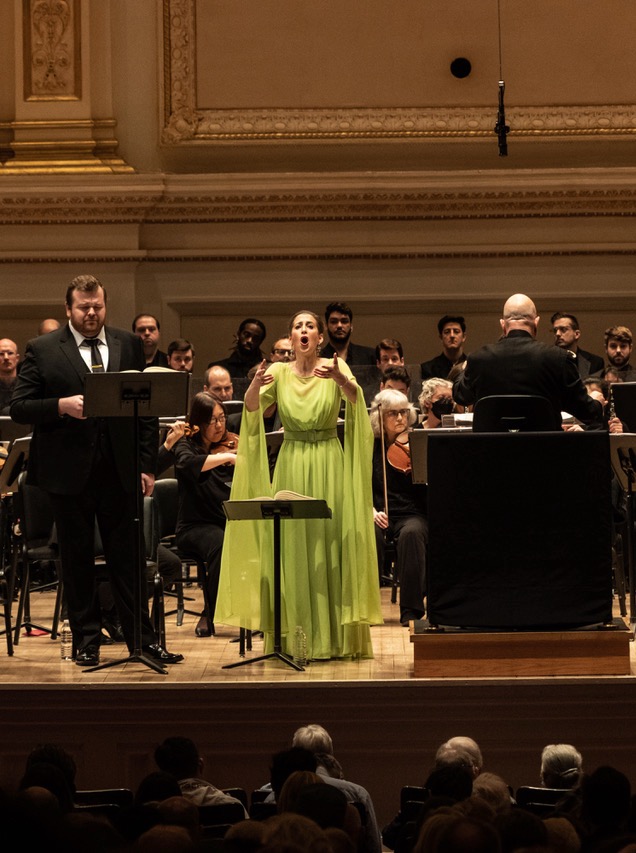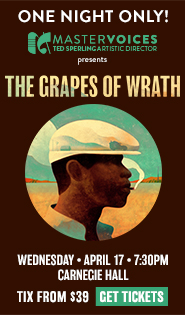A tree grows in Carnegie as Botstein, ASO revive Strauss’s “Daphne”

Richard Strauss’s late, one-act opera Daphne is not exactly action-packed. Even after three drafts of this “bucolic tragedy” by librettist Joseph Gregor, the great musical dramatist had only the simplest of plots to work with: Man and god fall for the same girl. God kills man. Stricken with guilt, god grants girl her wish to be transformed into a tree.
It is the magically rising, intertwining music of that final transformation that has kept the reputation of Daphne, well, evergreen. Frustrated by wordy libretto options, Strauss the tone poet abandoned voices almost entirely and let the orchestra finish the opera by itself. He was so pleased with the result that he subsequently took every opportunity to go to the piano and play the passage for visitors.
The rest of Daphne’s hour-and-three-quarters rarely live up to those final pages, but what would?
In Thursday night’s performance by the American Symphony Orchestra under Leon Botstein in Carnegie Hall, Strauss the craftsman was evident on every page, weaving a complex yet transparent orchestral texture that, with a few exceptions, avoided covering the singers.
The main exception was Kyle van Schoonhoven as the god Apollo, a taxing role calling for a Wagnerian combination of godlike power and plaintive high notes (lots of them). Despite admirable diction and focus, the slender-toned tenor contended unsuccessfully with the orchestra in the early going. He found more heft later, when the god had to acknowledge the human damage he had caused with his amorous adventure.
In this rare opera with two tenors, the role of the lovesick shepherd Leukippos was given bright, lyrical life by Aaron Blake. His flexible voice had a solid core and carried into the house with ease as he wooed Daphne and confronted Apollo, only to get an arrow in the heart for his trouble.
As the reluctant object of all this attention, soprano Jana McIntyre slimmed her voice down to fit the libretto’s description of her character as “very young, almost a child,” lightly negotiating perilously high fioriture in praise of flowers (and trees and grass). High notes of more power would follow, in Daphne’s grief for her friend and would-be lover, then wordless high pianissimo as the girl joined her beloved trees at the close. McIntyre’s technically secure and affecting performance gave the opera strength at its center.
Strength was also evident in the more peripheral roles of Daphne’s parents, the fisherman Peneios and his wife Gaea—who, in this pastoral mélange of divinities and humans, are also the gods of river and earth, respectively. Stefan Egerstrom’s full-bodied, expressive bass-baritone summoned the shepherds to the feast of Dionysus with godlike authority. Though billed as a mezzo-soprano, Ronnita Miller embodied the earth in smooth lines that descended to some of the lowest notes in the female vocal repertoire as she advised Daphne to embrace her womanhood at the feast.
There was more than a little of Wagner’s Rhinemaidens in the duetting maids who teased Leukippos with visions of love’s delights if he would don the dress and jewelry Daphne had scorned and attend the feast in disguise. Mezzo-soprano Ashley Dixon and soprano Marlen Nahhas sparkled in the roles.
The clear-voiced baritone Kenneth Overton kicked off the opera with a sturdy turn as the First Shepherd, assembling three of his colleagues (ably sung by Jack Cotterell, Paul Holmes, and Blake Austin Brooks) for the feast.
Summoned to the feast by an eight-foot-long alpenhorn downstage right, the men of the Bard Festival Chorale vigorously provided the opera’s social context as a lusty chorus of shepherds.
The complexity and chromaticism of Strauss’s score sometimes taxed the orchestra’s intonation, and the horns had their insecure moments, but overall conductor Botstein led a performance that vividly conveyed the opera’s storms (both meteorological and psychological) and romantic ecstasies.
Although Strauss rejected the idea of closing the opera with a chorus, he later circled back to Gregor’s draft and requested additional verses for a separate choral piece about the tree-girl, An den Baum Daphne, which was performed Thursday by the Bard Festival Chorus as a sort of prologue to the opera. (According to the informative program notes by Strauss scholar Bryan Gilliam, the coupling of these two works in one program was likely a U.S. first.)
The choral piece’s performing demands were severe: nine-part counterpoint, every bit as chromatic as the opera, to be sustained and kept in tune for twenty unaccompanied minutes, with sopranos emulating the operatic Daphne’s stratospheric flights. Under Botstein’s direction, with preparation by James Bagwell, the Bard Festival singers rose to those demands in a lush-toned, poetic performance.




Posted Mar 25, 2023 at 2:24 am by Sanford Friedman MD
It’s refreshing when a review gets it right! My only reservation is as good as the review was of Jana McIntyre’s performance, it underestimated its brilliance . This beautiful delicate appearing young woman has an instrument that can soar to the back of the hall (a requirement for Strauss), and yet can be as beautifully fragile as required. Also she has hardly any rest, and it was a wonder to watch a singer maintain this kind excellence without crashing. Thank you, David Wright
Posted Mar 25, 2023 at 10:29 am by Donald Jones
An absolutely gorgeous piece. So glad they performed it
Posted Mar 25, 2023 at 12:56 pm by Tiana Leonard
I want to endorse David Wright’s comment. McIntyre beautifully evoked Daphne’s fragility but managed to outsoar the enormous orchestra — I thought it a magnificent performance.